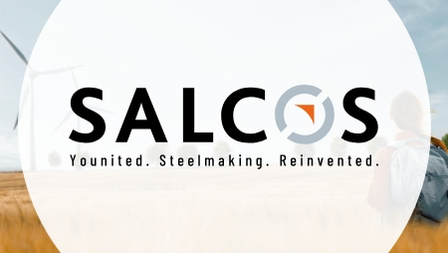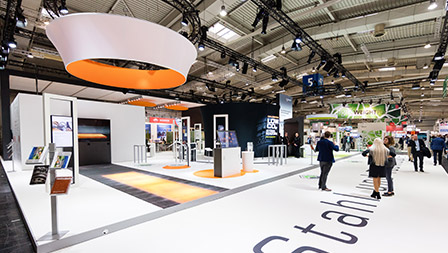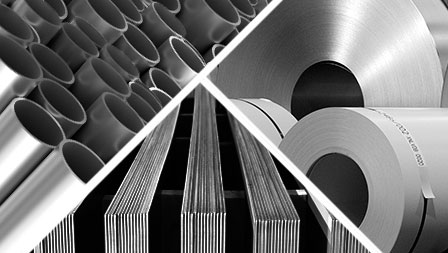Key data for the financial year 2018
27.02.2019 | Salzgitter AG
Salzgitter Group delivers the best result for the last ten years
- Earnings before taxes raised by almost 50 % year on year
- Additional profit contribution of € 150 million realized from internal measures highlights their significance
- Guidance for the financial year 2019 affirmed:
- slight increase in sales to above the € 9.5 billion mark,
- pre-tax profit of between € 125 million and € 175 million
The Salzgitter Group closed the financial year 2018 with the highest pre-tax profit for a decade. Along with the performance of the Strip Steel Business Unit and presentable contributions from the Trading and Technology business units, above all profit improvement potential amounting to around € 150 million, realized for the first time from internal programs of measures, contributed to this result. The financial basis and balance sheet of the Group remain sound with an equity ratio of 38.1 % and a net financial position of € 191.6 million.
The Group’s external sales rose in the financial year 2018 mainly on the back of selling prices to € 9,278.2 million (2017: € 8,990.2 million). Earnings before taxes result increased to € 347.3 million, exceeding the year-earlier result (2017: € 238.0 million). The result comprises € –62.8 million on balance in burdens from special items (2017: € –82.9 million) and a contribution of € 44.0 million from the investment in Aurubis AG, a company included at equity (2017: € 79.3 million, including effects from the convertible bond). An after-tax result that stood at € 277.7 million (2017: € 193.6 million) brings earnings per share to € 5.06 (2017: € 3.52) and return on capital employed to 10.3 % (ROCE; 2017: 8.6 %).
Chief Executive Officer Prof. Dr.-Ing. Heinz Jörg Fuhrmann commented as follows:
“In 2018, key political powers have unwarrantedly called into question free trade maxims that have been in place for decades. In our industry, this has resulted in the feared redirection of trade flows and consequently to a new record for steel imports into Europe. Against this back-drop, we can be just that little bit proud of how our Group developed in the past financial year: Earnings before taxes of € 347.3 million represent the best result for the last ten years. It’s not often that you encounter something like this, especially as the sources of strength largely derive from our own endeavors, and not from more favorable market conditions. The profit improvement potential of around € 150 million realized from programs implemented since 2013 are proof that we focus on rigorously taking the Group forward, also in years when the economy is good. Given the likelihood of challenges increasing in the current year, it will be about resolutely continuing to chart this course.”
Development of the business units
The external sales of the Strip Steel Business Unit rose to € 2,341.0 million, above all on the back of selling prices (2017: € 2,159.8 million). Shipments also increased. With earnings before taxes of € 205.8 million, the business unit reported notable growth thanks above all to better revenue quality (2017: € 182.0 million). In addition, the programs of measures had a positive impact, with a countereffect emanating from the higher cost of raw materials and energy.
In a market environment characterized by the sustained high level of heavy plate imports, the shipments of the Plate / Section Steel Business Unit reached the year-earlier level. The section steel segment was almost able to compensate for the downturn in volume in the heavy plate business. At € 1,026.4 million, external sales matched the previous year’s figure (2017: € 1,024.3 million). The business unit generated € 24.8 million in earnings before taxes, achieving a much higher result compared with the previous year (2017: € –57.7 million) that was impacted by impairment at Salzgitter Mannesmann Grobblech GmbH.
Against the background of a slight decline in shipment volumes, the Mannesmann Business Unit achieved stable external sales due to selling prices (€ 1,118.6 million; 2017: € 1,093.5 million). The business unit reported a pre-tax result at the level of the previous year (€ –5.4 million; 2017: € –5.6 million), which included special items of € –24.0 million on balance (2017: € –21.0 million in expenses for measures to achieve structural improvements).
The shipments of the Trading Business Unit fell somewhat short of the 2017 figure due to the lower volume of project business and the lack of large-scale contracts in international trading. The business unit’s external sales settled at the year-earlier level due to higher selling prices (€ 3,267.7 million; 2017: € 3,229.9 million). At € 50.5 million, the Trading Business Unit again generated respectable earnings before taxes (2017: € 70.5 million).
Bolstered by growth in all business areas, the Technology Business Unit raised external sales to € 1,338.2 million (2017: € 1,284.7 million). Thanks to the presentable earnings performance of all three companies, earnings before taxes totaled € 43.1 million (2017: € 6.6 million), which marks the best result since the business unit’s foundation in 2007. The “KHS Future” comprehensive efficiency and growth program that is focused on lowering costs and expanding the service business made a definitive contribution to raising profit.
At € 186.3 million, the external sales of Industrial Participations / Consolidation fell short of the previous year’s level (2017: €198.0 million). Earnings before taxes came in at € 28.4 million (2017: € 42.2 million). This figure includes the contribution of Aurubis AG, an investment included at equity, amounting to € 44.0 million. Reporting-date related valuation effects of foreign currency and derivatives positions also delivered a positive result. The result comprises € –38.8 million on balance in burdens from special items (2017: € 0.0 million), including a provision formed as a precautionary measure in connection with the known investigation of the German Federal Cartel Office ongoing since 2017 against plate and strip steel producers.
The annual financial statements for the financial year 2018 will be submitted to the Supervisory Board for ratification at its next meeting and a full version published on March 22, 2019.
Outlook
Compared with the previous year, the business units anticipate that business in the financial year 2019 will develop as follows:
The Strip Steel Business Unit expects a more muted development of business compared with the especially good previous year and anticipates stable sales and tangibly lower earnings before taxes due to margins. Import pressure on the European steel market is likely to remain high, on the one hand while, on the other, we assume that raw materials costs, especially for iron ore, will range notably above the 2018 level.
The heavy plate market continues to be characterized by particularly high import volumes from non-EU countries into the EU. In addition, the situation is aggravated by the lack of follow-up orders at the Mülheim-based company for the delivery of pipeline input material. In the sections steel segment, margins are expected to return to a normal level following a very gratifying previous year. Overall we assume sales that will be notably below the previous year’s figure and expect a pre-tax loss for the Plate / Section Steel Business Unit.
The development of the Mannesmann Business Unit will be impacted, at least in the first half of 2019, by the unsatisfactory capacity utilization of the German large-diameter pipe company belonging to the EUROPIPE Group. By contrast, the American Europipe companies will benefit from orders placed in the previous year and at the beginning of the year and, similar to Mannesmann Grossrohr GmbH, can expect further project bookings. After two very good years, the medium-diameter line pipe segment anticipates a normalization of demand. The precision tubes companies expect a generally stable situation, with the stainless steel segment seeing a moderate improvement in the market. With shipments and sales figures remaining virtually unchanged, we predict a marginally positive pre-tax result.
The Trading Business Unit anticipates an increase in shipments and therefore discernible sales growth in 2019. While achieving margins in international trading will remain under pressure due to the ongoing effects of ubiquitously restrictive trading policies, the declines predicted in margins in the stockholding steel trade should be at least partly compensated through business with additional value added. We anticipate earnings before taxes for the business unit that will once again be gratifying but nevertheless notably below the previous year.
Based on the high level of orders on hand and good order intake, the Technology Business Unit predicts a moderate increase in sales. The KHS Group will continue to operate on the basis of a selective order intake, expanding its service business and deriving additional positive effects from the measures introduced to enhance efficiency. The two specialist mechanical engineering companies of the DESMA Group anticipate that earnings will return to normal levels, with the assumption of a pre-tax profit overall that will exceed the average of previous years but will nevertheless fall short of the year-earlier figure.
In view of the gloomier sentiment and numerous economic and political uncertainties, we anticipate the following for the Salzgitter Group in the financial year 2019:
- a slight increase in sales to above the € 9.5 billion mark,
- a pre-tax profit of between € 125 million and € 175 million and
- a return on capital employed (ROCE) that is tangibly below the previous year’s figure.
As in recent years, please note that opportunities and risks from currently unforeseeable trends in selling prices, input material prices and capacity level developments, as well as exchange rate fluctuations, may considerably affect performance in the course of the financial year 2019. The resulting fluctuation in the consolidated pre-tax result may be within a considerable range, either to the positive or to the negative. The dimensions this volatility are illustrated by the following worked example: with around 12 million tons p.a. of steel products sold by the Strip Steel, Plate / Section Steel, Mannesmann and Trading business units, an average € 25 change in the margin per ton is already sufficient to cause a variation in the annual result of more than € 300 million.
Disclaimer: Some of the statements made in this report possess the character of forecasts or may be interpreted as such. These are made to the best of the Company’s knowledge and judgment, and by their nature are subject to the proviso that no unforeseeable deterioration occurs in the economy or in the specific market situation pertaining to the division companies, but rather that the underlying bases of plans and outlooks prove to be accurate as expected with regards to their scope and timing. Notwithstanding prevailing statutory provisions and capital market law in particular, the Company accepts no obligation to continuously update any forward-looking statements that are made solely in connection with circumstances prevailing on the day of their publication.














